 Vampire Weekend's Surprising Jewish Stories
Vampire Weekend's Surprising Jewish Stories
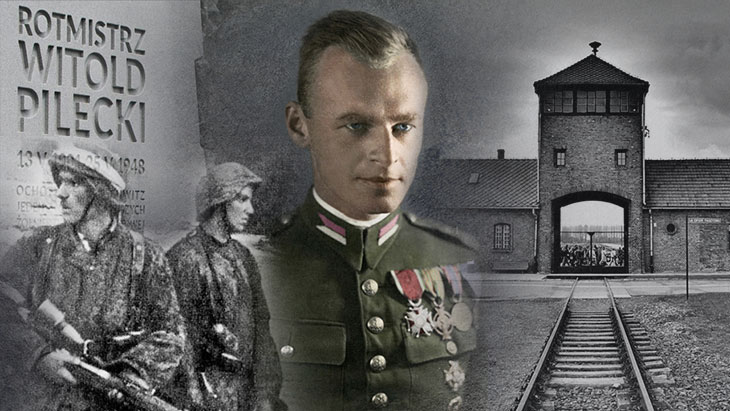

9 min read
Witold Pilecki heroically volunteered to enter Auschwitz where he organized a secret resistance.
For decades one of the most incredible tales from the Holocaust has been virtually unknown outside of Poland. The writings of Witold Pilecki, a Polish patriot who volunteered to be imprisoned in Auschwitz, were published in English only a few years ago. His incredible bravery and heroic actions deserve to be better known.
In 1939, Poland was invaded by Nazi Germany and was divided into two: the eastern half was annexed by the Soviet Union and the western half was absorbed into the Nazi Reich. In the east, the USSR managed to quash almost all attempts at Polish resistance, but in the western half a top-secret resistance dubbed the Underground State and Home Army managed to function, resisting Nazi rule. Witold Pilecki was a 38-year-old former Captain in the Polish Army who’d retired, married his wife Maria, and was working as a farmer and raising his two children, Andrzej and Zofia, in an area of Poland that is now in Belarus.
With his homeland in tatters, Pilecki left his family and travelled to Warsaw to help organize a resistance. Facing these Polish fighters, the Nazis decided to set up a concentration camp to house political prisoners of the new regime. They chose the Polish town of Oswiecim, or Auschwitz.
Two of Pilecki’s fellow resistance fighters were among the first prisoners transported from Warsaw to Auschwitz, in August 1940. Telegrams arrived for their families a few days later informing them their loved ones had been killed. The Polish underground desperately wanted to know what had befallen these men. Pilecki volunteered to go to Auschwitz and report back on conditions there. If possible, his mandate included also raising a resistance movement inside the camp and ordering a breakout.
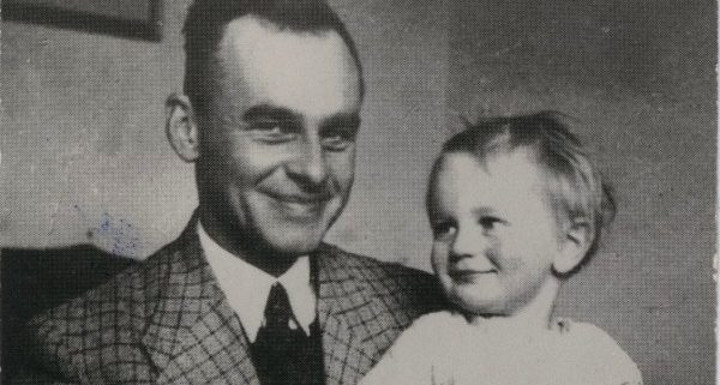
On September 19, 1940, Pilecki deliberately joined a group of men being arrested by Nazis in Warsaw. He was sent to the camp with nearly 2,000 other fighters, and given the number 4859. He would remain a prisoner there for nearly three years.
While many prisoners in Auschwitz reported losing all hope, Pilecki never stopped thinking of himself as a man on a mission. As a political prisoner, he never endured the especially brutal and deadly conditions that were reserved for Jewish prisoners, but he did survive horrible privations too.
“You’re either the greatest hero or the biggest fool.”
On his first day in Auschwitz, Pilecki watched as all the men on a train were shot as soon as they arrived at the camp. He saw one former judge beaten to death before his eyes. Pilecki himself was hit so hard that two of his teeth fell out. Pilecki and his fellow prisoners were shaved, given prison clothes with a red triangle (signifying political prisoners), and told that none of them would ever leave Auschwitz alive. When Pilecki told a fellow prisoner he was there to form a resistance, the prisoner told him, “You’re either the greatest hero or the biggest fool.”
Instead of succumbing to despair, Pilecki got to work. He told the prisoners news of the outside world and wrote a report on the conditions inside Auschwitz, which he managed to smuggle out of the camp and send to the resistance movement in Warsaw. His anguished first report was sent to Poland’s Government in Exile in London in March 1941. They passed it onto the Allies. In his report, Pilecki appealed to the Allies to bomb Auschwitz and end the “monstrous torture” that was taking place there.
The report was forwarded to the highest levels of the British military and might have resulted in action had not Sir Charles Portal, Chief of the British Air Staff, intervened. Sir Charles warned that any raids on Auschwitz “avowedly conducted on account of the Jews would be an asset to enemy propaganda” and declined to act. Pilecki’s torture, and that of this thousands of fellow prisoners in Auschwitz, continued.
Pilecki continued to work, organizing his fellow Polish political prisoners to smuggle in food, plan the occasional escape, and bribe guards to reduce punishments. He organized about 500 prisoners to be part of a top-secret resistance organization inside of Auschwitz, which Pilecki called the Union of Military Organization, known by its Polish initials ZOW.
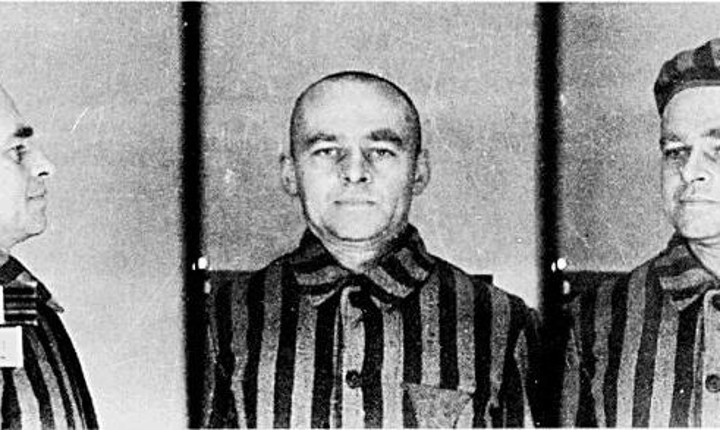
For a while, ZOW members managed to construct a radio from parts that were smuggled into the camp and reported on conditions to the outside world. They abandoned this attempt when the risk of being caught grew too great. Pilecki survived bouts of typhus and pneumonia, and managed to live on starvation rations. Yet these monstrous cruelties of Auschwitz were set to increase.
When the Nazis broke their non-aggression pact with the Soviet Union in June of 1941, the eventual fighting exposed millions of eastern European Jews to the Nazis’ murderous killing machine. For a few months in 1941, Soviet prisoners of war were the main target of mass killings at Auschwitz; the notorious gas Zyklon B was first used on Soviet prisoners. Ever the conscientious resistance professional, Pilecki meticulously documented the carnage, writing that “The men (Soviet POWs) had been so tightly packed (in gas chambers) that even in death they could not fall over.”
In 1942, the main aim of Auschwitz shifted to the mass killing of Jews. Over one million Jews were systematically murdered in Auschwitz; most were gassed and then their bodies were burned in the camp’s giant crematoria. Pilecki was determined to document the death of these Jews. “Over a thousand a day from the new transports were gassed,” he wrote.
Pilecki also noted the callous indifference to this death and suffering on the part of Polish civilians in the town and countryside nearby. “When marching along the gray roads (on a work detail outside of the camp)...we would encounter young couples out walking, breathing in the beauty of springtime, or women peacefully pushing their children in prams - then the thought uncomfortably bouncing around one’s brain would arise...swirling around, stubbornly seeking some solution to the insoluble question: We are all...people?”
Pilecki hoped that his words might galvanize the Allies to take action and bomb Auschwitz. Each time he waited in vain.
Pilecki managed to write and smuggle out three comprehensive reports detailing life in Auschwitz as it evolved from a camp primarily housing political prisoners into the center of the Nazis’ monstrous killing machine targeting Europe’s Jews. Each time he managed to smuggle out a report at enormous risk, Pilecki hoped that his words might galvanize the Allies to take action and bomb Auschwitz. Each time he waited in vain.
As the years went by, many of Pileckis’ fellow ZOW resistance members were killed. He realized that he could do much more to fight the Nazis outside of Auschwitz and began to plot an escape. His main goal was to speak with Polish resistance fighters and Allied forces in person and persuade them to launch an assault on Auschwitz and stop the killings there. On one occasion, Pilecki gave up his spot as part of an escape plan to another political prisoner who was in greater danger of being killed.
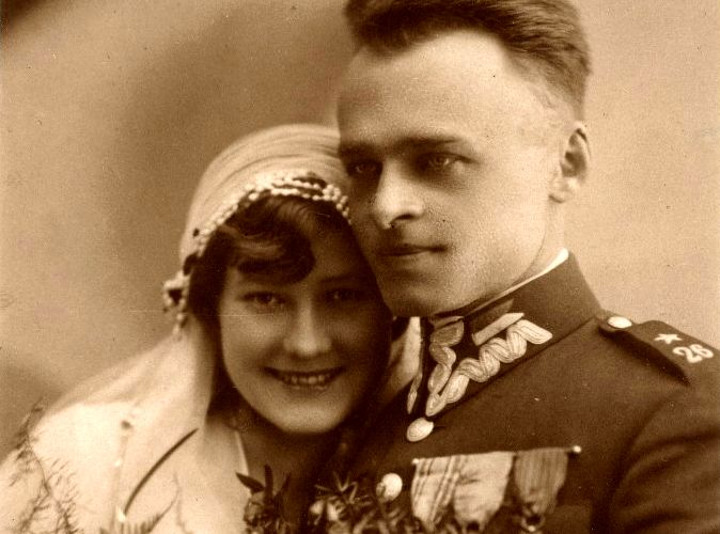
Eventually, in April 1943, Pilecki and two fellow ZOW members managed to escape, prying the bolts off a door and fleeing the camp. Pilecki was shot but managed to travel 100 km on foot until he could reach the home of a fellow resistance member and rest. Pilecki still hoped that the Allies would attack Auschwitz, but as the months went by nothing happened.
Still seeking ways to fight the Nazis, Pilecki travelled to Warsaw to fight in a major uprising against Nazi rule there. Pilecki, an older former officer who’d endured years of brutal imprisonment and torture, became known as “Daddy” among the young resistance fighters who were determined to make a last desperate stand against the Nazi murderers.
In August 1944, Pilecki fought to defend a key street that had been a major thoroughfare inside the now-empty Jewish Ghetto known as Jerusalem Avenue. Today, the street is the site of the Warsaw Uprising Museum. Historian Norman Davies documented Pilecki’s crucial input to the battle at this strategically crucial site: “Almost every day... he captured, lost, and recaptured (an important holdout). Repeatedly driven out, he returned and with deadly cunning repeatedly expelled the German defenders. He lived to fight elsewhere. But so long as he threatened this one vital pressure point, the German command was constantly made to feel insecure.” The spot he defended became known during the fighting as Pilecki’s Redoubt.
After the Warsaw Uprising was brutally put down in September 1944, Pilecki was sent to a POW camp in Germany. Liberated by American troops in April 1945, he travelled to Italy where he fought with Polish troops in the final days of the war. In Italy, he also wrote his final report on what he’d witnessed at Auschwitz. He suspected that he might not have long to live and it was crucially important to him to record all he’d seen for future generations.
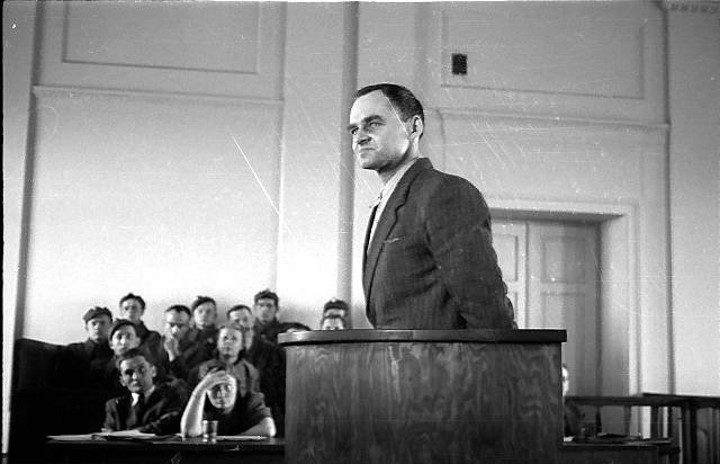 Pilecki in court in Poland, 1948.
Pilecki in court in Poland, 1948.
After the war, Pilecki returned to Warsaw and continued his activities for the Polish underground, this time gathering intelligence on the new Communist government of Poland which he opposed. On May 5, 1947, he was arrested and brutally tortured by the government of Poland. He was given a show trial and condemned to death. He was executed May 25, 1948.
Pilecki’s son Andrzej later recalled his father’s final letters to him and his sister. “He didn’t know he was leaving us forever,” Andrzej explained. “But in letters he would write that we should live worthwhile lives, to respect others and nature. He wrote to my sister to watch out for every little ladybug, to not step on it for a reason. ‘Love nature.’ He instructed us like this in his letters.”
Pilecki’s final report on Auschwitz was translated into English in 2012 and released as The Auschwitz Volunteer: Beyond Bravery. Now a new book The Volunteer: One Man, an Underground Army, and the Secret Mission to Destroy Auschwitz by Jack Fairweather tells Pilecki’s story for a new generation.
Witold Pilecki’s legacy of courage and moral strength deserves to be remembered.
